MENNO VON BRUCKEN FOCK
STEVE HACKETT, Out Of The Tunnel's Mouth
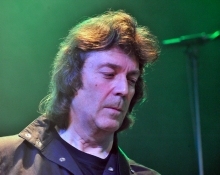
Out of the Tunnel's Mouth is Steve Hackett's latest solo album. After Genesis and a temporary adventure with GTR, Steve released an impressive number of solo albums, partly electric, partly tributes and also several classical orientated albums. His latest release was realized in very difficult circumstances, because Steve had to deal with his divorce from Kim Poor with to whom he had been married for 32 years. Modern technology saved the day because a big part of the recordings were done in his flat! Originally this interview was planned on April 27 but the phone didn’t ring, however the second attempt was quite alright. Steve made it to the place he had to phone from just in time and in a mere three quarters of an hour, this is what he had to say.
Hello Steve, you have an awesome new album. I counted 22 studio albums excluding Out Of The Tunnel's Mouth. Is that correct because on your website the count is 29? 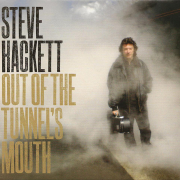
"It depends on what website you have been looking. To be honest I haven’t counted them lately but the new official site should be correct. As a result of a court case I’ve been awarded the old website as well since I won the case last week. It has taken me three years to get it back! So probably I will try to amalgamate the two but although the court decision was in my favour I don’t have the site ‘physically’ at my disposal. All I know I’ve done about fifty albums in my time, some of them are live and some of them are studio albums."
What's the driving force for you that keeps this business interesting and challenging after some 40 years as a musician? Going on the road must be tiring?
"Well, actually I enjoy being on the road. I like the rough and tumble on it you know. I check into a room I’ve never seen before and if it’s halfway decent, that’s okay and as soon I’ve checked in, I’ve got to be checking out again to go off to the gig and in some cases I don’t have a chance to check until after the show! It’s kind of funny to look at an empty room, a venue of whatever size with no people in it and you think oh my god, it’s like a ghost town, a large empty warehouse and it looks like nothing till something’s going on, until there are people in there; then, suddenly a bit later, everything comes to life: Q-lights, an enthusiastic audience, it’s magical and I marvel at that. Almost every night there’s a sort of alchemy that kicks in. In a way I sort of forget gigs with inconsistencies, because they’re inevitable. It’s not a matter of perfection for me anymore; the most important thing is going up the stage and being there, connecting to the audience, concentrate and trying to get it right. When I go up on stage, I don’t have that level of fear I used to have when I walked out of the dressing room. I don’t feel that anymore and I don’t need to be someone else. I’m the same bloke as I am back stage. It’s in the lap of the gods: if it’s going to work, it’s gonna work. If the place is going to catch on fire, if the electricity is going to cut out. It all happened to me a lot of times and to other people as well. I’ve seen an extraordinary amount of things happen on stage."
Well, one thing is for sure: you have a fantastic band with you!
"Yes, they are an incredible band and the most extraordinary thing is, they are growing better all the time. I’ve discovered there are more levels we can do together. There’s all sorts of stuff going on, gradually evolving, even with the old songs!"
By the way: congratulations on your introduction to the Hall Of Fame with your old buddies of Genesis. What did this mean for you personally?
"Thank you! It was a very emotional evening for all sorts of reasons. We British guys are sort of stiff upper lip you know, not really showing one’s feelings. But the funny thing was, that when the evening progressed, that all changed. We were the first band to be celebrated and I thought I would be able to relax the rest of the evening, but time and time again there were people up on stage and many times they were playing songs that have been part of my childhood and these songs really kicked in. The times I was in listening to these songs for the first time, mostly pop stuff, it was a lift. It seemed to me the very best of what people were capable of doing and I found myself in tears listening to Ronnie Spector singing Be My Baby. You think of The Ronettes, The Crystals and you think: my God, I remember listening to these songs when fights were breaking out and people were covered in blood! The soundtrack to Bloodletting, these songs of love, when I would start to dance on the age of twelve and all these fights breaking out. I found it all the more emotional because of the difference between the sentiment of the songs and the environment in which it was received in the early sixties. All that frustrated testosterone around before it evolved to the level you were able to hold a ladies’ hand or even kiss her, you know there was so much to be done! Also listening to Jimmy Cliff singing Many Rivers To Cross, which he sang wonderfully and the performance of the band, led by Paul Schaefer was just terrific. I’m full of admiration for the team responsible for this event! I got to meet Jimmy Cliff, got a chance to congratulate him and also Graham Nash, celebrated as being part of The Hollies. I’ve been a huge fan of Graham’s and I got to meet him, congratulate him and become a fan. It gave me a chance to be a teenager again as well as being one of the old exhibits in one of the museums of my own making if you know what I mean!"
What is your relationship with Camino Records at the moment?
"I’ve handed Camino Records to my ex-manager; I’ve given that to him but the records I’ve released on that label I retain the rights to."
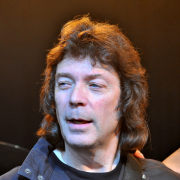 Talking about the new album: do the picture and/or the title of your new album have anything to do with the period you recently went through?
Talking about the new album: do the picture and/or the title of your new album have anything to do with the period you recently went through?
"Yes, they have. Just to have been able to produce an album under those circumstances took much more effort compared to all others because of all the litigations surrounding my career, but that’s over now. There are still a lot of things I can’t comment on, because that’s the way it all works in the legal system. Basically there’s an agreement and legal documents are being signed as we speak so, yes, it’s all over and as I said after three years of struggling, I’m really very happy at this point!"
The original release from the UK on Wolfwork Records, your own label I suppose, seems to be withdrawn from the continental market. The album was originally planned for October last year. Why did that happen and how did you end up with Inside Out?
"Yes, Wolfwork records is my new record company. We had the album ready to go in the fall of 2009; I had a tour which was already booked and a deal waiting on the table, but what happened was that my right to release that album was contested in that was one of the many court dates that took place. So indeed it was very frustrating to go on tour to support an album, of which I had pressed up copies in the back of the equipment van, but for several nights I wasn’t able to release it like in Zoetermeer, the Netherands, our first gigs. Then the court decision came through and I was able to start selling the Wolfwork version which was very joyful. Inside Out had been up to release the album in the first place so when that court decision came through we were able to conclude the deal that was offered to me in an earlier stage. But it always takes time to draw up contracts etcetera, so it took a few months before Inside Out could release the album. That’s show business, or perhaps should I say c’est la vie. I’m rather philosophical about it now, but fact is, the album drew a lot of attention and it has been noted that it sounds good. Surely I lost time because of all of that but it made the album like a Cinderella, but that little Cinderella got good legs! It’s one of my babies you know and some of them come into the world fairly easy and this one came a lot harder, but I also think it’s a good album."
You're getting an awful lot of raving reviews. Does that surprise you?
"Well, I suspect the things I had to fight against probably defined this album more than others and the fact it has been recorded in my living room rather than in the studio also contributed to the way it sounds: sometimes the box is mightier than the building! I’m referring to the computer because a computer screen was the size of our studio. Like with any album you’re trying to get as many people listen to it as possible. It’s having the right reviews at the right time. It was a pity to see all those favourable reviews in the English press for an album that I couldn’t get out for people to hear! It seemed those reviews weren’t there at the right time but looking back, the wait might have let it taste a bit sweeter, I don’t know. Maybe in the future when I run into these kind of problems again – which I sincerely hope I don’t - I’ll go back to the idea of listening parties and do it that way."
Can you explain why the composing process and the recording process were so much different than on all previous albums? I understand the Apple computer played a huge role?
"Yes, that’s correct. I started with sketches that later became filled in and I decided that if it was going to work effectively in the computer we’d have to record very quietly. So 'Marshall amps' gave way to 'Sounds amps': very small amplification, played very quietly and that had an effect. I think that when you’re recording in a studio there's a tendency that you want to enjoy yourself to the extent whereby you crank up and you play very loudly. You think people can tell you actually played very loud and you might end up fooling yourself with volume. I’ve discovered that there are certain things you can do with an amp but there are also a lot of things you can do with D(irect) I(nject) that sound better, so I’m endlessly refining this process. There will be times that I will be bypassing the amps entirely and do it this way. I suspect the guitar work has been recorded more brightly on this album as a result of being a ‘DI’, but then we simulated the distance so much."
As you stated in the booklet of your new album, your guitar is as sharp as an axe, or might I say a razorblade, well in contrast to the pieces with nylon strings: melancholy versus aggression?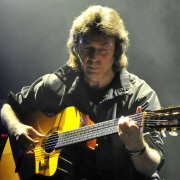
"Ha, ha, well yes, I suppose in your face the electric stuff would be the best way to describe it! You know, I’m always searching for the perfect guitar sound and at times I think I’ve hit it. Melancholy and aggression is also a good way of describing my emotions I guess. Maybe it ‘s like two halves of the same coin: trying to make up for the frustration and the loss. On the other hand I must admit I do love the nylon and electric equally and these days I’ve become a fan of the twelve string again. It’s a gorgeous sounding thing, but it always needs to have a context like everything else. You need to have the right song for it, you need the right chords. Anthony Phillips played the twelve string on a couple of tracks: we had a couple of electrics arpeggiating, picking and a couple of twelve strings together and the four them just sounds like one big rich guitar. It’s an effect that I managed to use years ago as did Anthony Phillips when we both worked with Genesis, although he was my predecessor: we weren’t playing in Genesis at the same time. There’s a kind of 'Genesis sensibility' about guitars and how to use them. Normally in those Genesis days, whenever a tune was guitar based, it was usually based on a twelve string and not on an electric: aggression fest."
Well that’s information completely new to me, but of course Mike Rutherford plays six and twelve strings too?
"Yes, that’s right and Tony Banks too! The four of us played those guitar lines, not at the same time but when I was working with Genesis we often use to have three twelve strings working together."
Did you ever work so closely with co-writer Roger King as on this album?
"We had to work closely together and a lot of what you hear on the album is largely the work of Roger King who I’ve long championed as a superb musician, engineer and producer. He’s really quite something and I think he stars in the ascendant. Funny enough he and I have just been working on an album with Chris Squire, which is actually done as far as I’m concerned unless Chris comes back to me with second thoughts like ‘oh, we’ll need another tune’. It sounds very good and Roger is also producing this album. I don’t know when it’s going to come out because we haven’t worked out on which label it would have to be on, who’s gonna get it, manage it, sell it, whether there will be shows, etcetera."
Well that’s some breaking news! Who else is playing on that album?
"Roger King of course and on drums we have Jeremy Stacey. On a couple of tracks there’s Amanda Lehmann on vocals and harmonies, so there are actually five people involved."
Is it correct you didn't use a flesh and blood drummer on Out Of the Tunnels Mouth and if so, why not?
"Yes, it’s true! Unbelievably, indeed it’s not a flesh ‘n blood drummer. Now I have to say that of all the albums I’ve heard with programmed drums - and I’ve heard quite a few in my time as I know you’ve had yourself - this is by far the best example of edit-due (?) programming. I’m not seeking to put any drummers out of work because at the end of the day, had I have access to my original studio I would have had real drums. On the special edition of the album Gary O’Toole is playing drums and singing so at least there’s some justice there. I would have liked to have him on the entire album and I must say the songs that he plays, and we do most of them live, he plays very, very well and it’s difficult to know what is the definitive edition! I think especially on the blues track I do like his drumming, it’s very syncratic. You also have the wonderful bass work by two people: there’s Nick Beggs, who’s on the majority of the album but also Chris Squire on a couple of tracks and I thrall to the sound of the bass on this album as well so I think that moved on a notch. I remember years ago Steve Howe - we were talking about the line up of GTR - and we were about to get Phil Spalding involved, a fabulous player with a great sound. He was telling me what difference it made to have a great bass player in the band and he was referring to Chris Squire. I totally agree with him and I think the bass makes a whole lot of difference and if the guy has got a guitarist attitude it’s not the second string to the guitar at all but for me it’s just as important! Both those guys, Nick and Chris are incredible players in different ways. Also Nick Beggs plays the Chapman stick. Funny enough he’s just written a new piece on Chapman stick, what he started doing, which is very, very good."
On your last album you covered Man In The Long Black Coat by Bob Dylan and on Watch The Storms, the track The Devil Is An Englishman by Thomas Dolby. How do you find such tracks and on what basis do you decide you want to record them?
"Well, about The Devil Was An Englishman: I once saw a show that Thomas Dolby was doing called The Alternative Hair Show (a yearly event in London to raise funds for the battle against leukaemia, MvBF). Basically it was one dancer and a whole bunch of models and I thought the song was terrific, as a kind of a rap-tunal monologue. I thought it worked very well, it was funny, it was witty, clerkly, dark and with tongue-in-cheek. The other one has got this line in it. Funny enough I was just listening to an anthology by Bob Dylan, driving up here! It’s the line about the old dance hall on the outskirts of town. You know that line is really like capturing lightning in a bottle, isn’t it? It’s absolutely a propos of a time and place that I remember. The best kept secrets, the best music on the outskirts of town where it really all happens. Somehow being on the outskirts of town doesn’t have the pressure of being central, on preferential places if I can call them that. It has the edge of not being the ultimate place to be someone’s major breakthrough. I think therefore you get possibly the best performances out of people. So it’s this enigmatic lyric that drove me; and the idea of doing a guitar heavy version was also appealing. I’ve just sort of grown my way into that one: a bit of a rough guide vocal, not entirely in tune, not perfect but I decided to let it go, to not be that careful. I don’t think any of Dylan’s stuff is that ‘careful’, rather the opposite."
I would like to go quickly through the songs on Out Of The Tunnels Mouth if you’re okay with that. There’s an obvious link to the old Genesis sound in Fire On The Moon, but you're mentioning Chris Squire on the bass with a Bolero rhythm: indeed it is that rhythm but I can hardly recognize Chris' style of playing the bass nor his sound. Why does he play so 'low profile'?
"Chris plays a in a number of styles, and not each of them uses the same bass sound. Funny enough he was mentioning the days he used to work with Eddie Offord the other day and how he always used to like to have the bass playing loud in the mix. I think you can do that when you have that very choppy sound that he has, almost sounding like a guitar. In other circumstances, if you have a lot of bass in a track and you start turning that up in the mix, it may get to sound very woolly. The nice thing about Chris is that he understands exactly the amount of bass that should be on something. I’m talking about the amount of bass on a bass guitar; sometimes when he and I were working together he suggested to take some bass out or in another part adding some. Not the level but the amount of bass guitar, how round it should be; strangely enough on one track, of which I thought it sounded absolutely perfect, he said to me: 'why don’t you turn the level of the bass guitar down just a little bit?' So we did and funny enough now it sounded more powerful, very strange! I’ve always thought the bass guitar would sound more powerful the louder it was, but he was absolutely right, because we’ve got that demon drum sound, that powerful bass guitar and the guitar lines and it almost sounded like a power trio sound on one or two things. I’m talking about music not released yet, so don’t get confused! But, I’m anxious to get it out, I must say."
Nomads, some Spanish flamenco influences? Do you have a special affection for Spain or Spanish music?
"Yes I do! I do have a specific love for Spain. It’s not just flamenco, but also the classical guitar, the Spanish guitar. I’m in love with the sound of that guitar. Thinking of the sound of that flamenco guitar; it’s just incredible. As I was driving up to Norfolk, where I am today I was driving for four and a half hours and just making it in time for this interview, I was listening to one more thing after Dylan. After a break I put on Classic FM, which is a classical station here, and I got to listen to Concierto D'Aranjuez, the slow movement. It was a version that Julian Bream had done with Simon Rattle and it was a spectacular version. I’ll probably record that one myself some day, I have to get around to it!"
That would be awesome! The next track, Emerald and Ash, has two faces: a very melodic gentle one with some help of old friend Anthony Phillips and a more rocky, bold face with stunning electric guitars, with some blues influences?
"Yes, that’s right. The stuff at the end is a sequence Roger came up with and we brought that together with the earlier bit. There’s a little short section that introduces the track which is a really cross between Rush influences and orchestration, the orchestral textures used very quietly. There’s a lot of Genesis influences in that track as well which came to be very naturally, because I was working with Anthony Phillips and it just ended up having that kind of instrumentation. The more aggressive section you’re talking about was Roger’s idea, but then I soloed over the top of it. We used Mellotron, it sounds like a guitar in the early section, but we’ve driven these strings so hard, that it’s almost like you took those and put them through a fuzz box. There’s a great drum sound Roger came up with in that section, which I call a kind of stump section and then you have some Mellotron flutes that provide the bridge back to the opening scene. Apart from Roger, Nick and myself, there’s one other person involved: Rob Townsend play soprano sax on the opening and a couple of phrases but he uses that sax in a very oboe like manner."
Can you explain to a simple Dutchman what Tubehead and your remark in the booklet The death of Marshall Cabinet is all about?
"Ha, ha, ha, I Was thinking of some people I’d like to kill by sticking their heads in front of a Marshall Cabinet. I was thinking of the spirit of Marshall Cabinets metaphorically, symbolically you understand? I was thinking it might be possible to finish someone off by doing that; I don’t suggest anyone ever does it, because it would be a horrible death! Actually I’m using a sounds amplifier on that, so it’s not even a Marshall Cabinet, but the sound of that MC was captured in a very small kind of way, due to technology, played very quietly but really sounds quite screaming, doesn’t it? It’s partly the reverb on that one that gives it really this live sound of the guitar. I think it’s the rock guitar sound I’m the most proud of in terms of the rocking, screaming sound."
I think I hear a slight resemblance with an old Edgar Winter track called Frankenstein?
"Oh really? Yeah, I remember that track, but I haven’t heard it for years!"
In Sleepers there’s a section with a similar chord sequence as in George Harrison’s While My Guitar Gently Weeps?
"Yeah, you’re absolutely right! I’m a big fan of George Harrison, of Indian music and I think While My Guitar Gently Weeps is a great tune. One day I hope to cover it, when I get around to it, hopefully before I’m seventy or maybe when I do my pin-ups album..."
In Ghost In The Glass I recognized the same atmosphere as on Voyage Of The Acolyte.
"Really? That’s funny! I thought it was slightly jazzier than I’ve done in recent years, but more the soulful side of jazz. The guitar being a saxophone I suspect, more close to a brass sound and I was also thrilled by the chord sequence Roger and I came up with. I just came up with a glimmer of an idea and Roger made it much better, came up with all the details I needed. We had real strings as well as Mellotron strings used together to give it that slightly distorted but full sound like in the sixties."
Did you and Roger just send files to each other or were you working together in one room?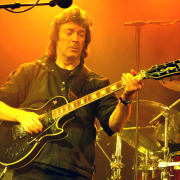
"Oh no, no sending files to each other. We were sitting in one room together. Physical interaction through conversation! Well in fact more like me interrupting him occasionally with the computer."
Still Waters, is there any relationship with Muddy Waters?
"Well, not really. I’m a great fan of Muddy Waters though. What can you say? It’s Muddy Waters, Little Walter and Sonny Boy Williamson, you’ve got the best that blues has got to offer and Otis Rush of course! Otis Rush with So Many Roads and also other great bluesmen like Peter Green, certainly Eric Clapton, and Jimi Hendrix and many others I saw ‘en passant’ in the mid sixties when the blues was booming to its height. Back then I was playing with a lot of guitarists who were far better than me at the time and I wonder if they’re still playing and what they’re doing."
As far as I know, Peter Green isn’t a shadow of himself anymore...
"Well, I’ve learned a lot watching Peter Green. When he was playing he was everything I wanted to be at that time and I must be grateful I suspect he doesn’t hold himself in high esteem enough to realize what a great guitar player he was at that time. I’m talking about the time he was with John Mayall, never mind Fleetwood Mac! Yeah, I was a big fan and I still am!"
In the last track Last Train To Istanbul there are definitely some Oriental influences. You stated thet you got inspired by a visit to Sarajevo, but that’s hardly the Orient isn’t it?
"Well, the thing about Sarajevo is, that it seems to be a meeting place of many different cultures. After the war of course you had a place filled with town squares where the church faced the mosque, faced the synagogue, all next to each other. There’s a tremendous amount of Turkish influences both architecturally and musically and although you’re not in Turkey, you feel you’re on crossroads in that place. I was luckily subject to a lot of that culture during the brief time I spent there. It was snowing continuously and I found it fascinating, I have to say! A visit to Istanbul is on my card, but I haven’t been there yet!"
At this point Steve I had to make a phone call to Italy and I’ve already taken more of his time than I had been hoping for, so my other questions about the live shows in Zoetermeer and his relationships with Jo and Amanda Lehmann are for some time in the future. Steve appears to have been saying that he still regrets the decision to leave Genesis, but then again: would we have had all those magnificent solo albums?